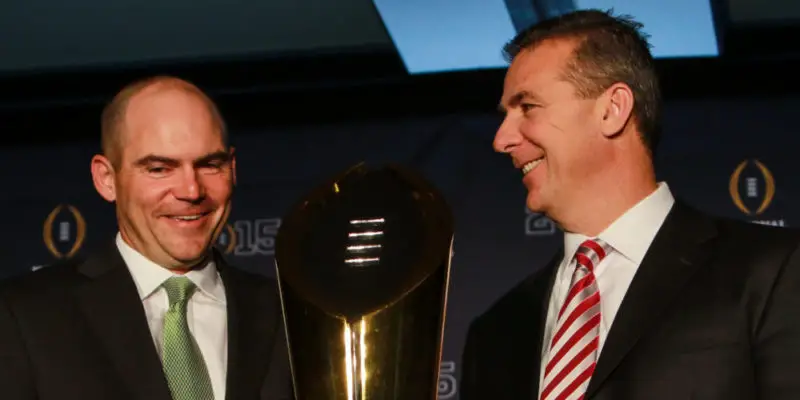Readers: Every writer on FishDuck.com is allowed to express their opinion in their articles. However, articles do not represent the views of the other writers, editors, coaching consultants, management, or the principals at FishDuck.com Charles Fischer
I never say “I told you so” and I don’t like people who do.
But I told you so.
I didn’t put any money on yesterday’s game. I could see it going either way. As hard as it was to fathom the Ducks dropping two in a row to Mike Leach’s Cougars a year ago, now? Not so much. Maybe the Ducks eked out the OT victory that eluded them last season. Maybe they came up short again in the 4th. What should be apparent to Ducks fans is that every conference game this year is in play. Struggling against Buffaloes and Cougars speaks to the sea change that has suddenly crested into a tsunami.
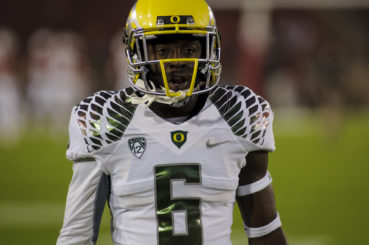
A dazed Thomas after big promises come up short against Stanford in 2013.
Mark Helfrich’s 2016 Ducks play terrible second-half football and only marginally better football in the first half. The Ducks gave up three TDs in the second half in each of their first three games. Colorado didn’t need a third to thwart Oregon’s anemic comeback. The lack of discipline and mental toughness has been building like a slow crescendo since Helfrich took over. But it’s been there the whole time.
One of the first big red flags that caught my eye was when De’Anthony Thomas promised a big day against the 2013 Stanford Cardinal to avenge the 2012 loss. The Ducks nevertheless lost 26-20. There were other warning signs but that one sticks out in my mind. The behavior, from a star player no less, was unrecognizable under Chip Kelly. And now, nearly four years on, Helfrich’s program is itself unrecognizable.
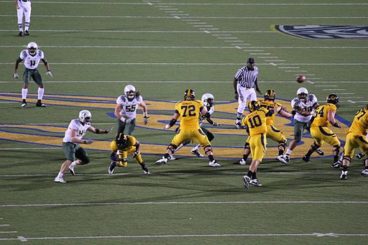
The Cal Bears came within 2 points after choking up Oregon with malingering in 2010.
When I asked whether we should prepare for a new type of football, I didn’t have losing football in mind. I didn’t expect such a precipitous devolution. I expected big first halves, troubling second half retrenchments, and more than a few goal line and red zone battles as time of possession and clock management became increasingly important. I foresaw screaming at the television during unbearably close games by recent standards. Because we have been a bit spoiled of late.
Outside of last year’s six-point margin over the University of Washington, you have to go back to the two-point margin in the 2010 Flim-Flam-Fake-An-Injury Bowl in Berkeley to see the type of close games I was expecting this season. When I (albeit incorrectly) foresaw for a 4-point victory over Nebraska, and still hoped for more, that was exactly the game I had in mind. But still I believed the Ducks’ talent and esprit de corps would lift our young men to victory. But as I sit here today, looking at the leadership, I’m not sure why.
To be sure, I was never a Mark Helfrich fan. Hailing from Portland’s own Lincoln High School in the early 1990s, I consider myself to be something of an idiot-savant at spotting poor coaching. You can’t hide it. You can’t fix it during a season. You can’t overcome it with a symbolic blue collar. It doesn’t get better with age. There’s no montage where the coach and team bond through hard work and humility during a three-minute rock ballad with a compelling bass line. Adversity and loss may teach young men how to pick themselves up and get back in line, but bad coaching squanders the very promise and opportunity of youth.
There’s one answer to bad coaching: 86.
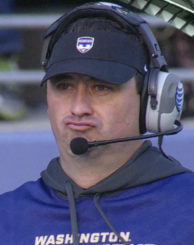
The Sark puckers up before his big promotion.
Coaching an elite football program is not an OJT opportunity. Oregon Athletic Director Rob Mullens has to ask himself: does Mark Helfrich have the chops to right this ship? Let’s examine that for a moment because I was never convinced Helfrich was the man for the job. Prior to the biggest promotion of his life, matched perhaps only by Steve Sarkisian’s mysterious and brief ascension to Trojan glory, Mark Helfrich spent three years as Chip Kelly’s OC. Does anyone today credit any of the Kelly-era success to Helfrich’s tenure as OC?
Prior to that wild success, Coach Helfrich was Big-12 University of Colorado’s OC (2006-2008, 13-24 combined record); Arizona State University’s QB coach (2001-2005, 33-28) and Boise State University’s QB coach (1998-2000, 26-10). I keep asking myself: what convinced Mullens that Helfrich could helm an elite program? His commanding sideline presence? At best, it was a Kelly-esque gambit: Kelly spent two years as an OC before his own promotion.
Under Helfrich, Coach Don Pellum was promoted, demoted, and replaced along with the entire defensive scheme. I have no bone to pick with Brady Hoke, but switching the base D from 3-4 to a 4-3 is no small affair. Plus, it’s hard to ignore that as the University of Michigan’s head coach, he had a disturbing trend, namely 11-2, 8-5, 7-6, and 5-7. After all, that’s why he was available on short notice. He was an improvement from Rich Rodriguez, but not good enough for Ann Arbor.
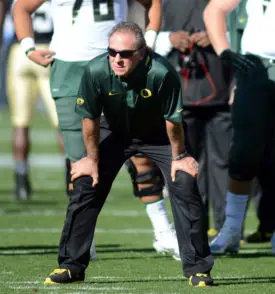
Aliotti had a quality sideline presence.
One may forget why Helfrich promoted Pellum in the first place: Helfrich didn’t know what to do after Nick Aliotti resigned. And why did Aliotti resign after investing 21 seasons in Oregon? Because a newcomer with a scant record of success, no time in the pros, and who had spent but three years under Chip, got promoted over him. Maybe I just never believed that was the right choice.
We know Aliotti told Mullens to find a new DC if he wasn’t named the head coach for 2013. For some reason, I doubt Helfrich had the stones to deliver the same ultimatum. How could he, after three years? And even if he had, I don’t he think he would have followed through. To be sure, Aliotti and Helfrich weren’t the only candidates. At least they shouldn’t have been. But for my money, I think the Ducks would be better off today under Aliotti’s stewardship.
So we come back to these questions about character. Resolve. Judgment. Is this the man we want overseeing fundamental changes that dictate the direction of Oregon football for years to come? And if so, how much time is he due?
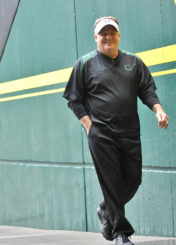
Kelly’s brief tenure lends credence to his Oregon-era critics.
Here’s my prediction in all its ugliness: Oregon will remain unranked as long as Helfrich remains the head coach. The ranking system is a thinly veiled popularity contest. But it is an important one for recruiting. Like it or not, even if you believe Helfrich can recover, he will not command the respect of the pundits. I didn’t cotton to the pundits when they disregarded Kelly’s revolution. But maybe they weren’t that far off the mark about Kelly after all.
No one questioned his skill as a coach but he was, it turns out, a flash in the pan. Win The Day won him a promotion to the NFL. Nor do the pundits’ preseason Oregon predictions this year now appear to be off the mark. Let’s not forget that many of the pundits we revile are experienced players. They can spot bad coaching too. Does anyone foresee Helfrich out-coaching the likes of Nick Saban, Urban Meyer, Dabo Swinney, or Jim Harbaugh to a national title? How long that will take? Because I don’t see it.
What is the Helfrich era going to cost Oregon? In terms of recruiting, it’s an unknown but frightening variable. But we know the real-time cost. Not only did he earn a contract extension after his appearance in the title match, but Oregon paid Helfrich $3.15M for last season. This season, it’s $3.3M. Hoke signed a record breaking DC salary at Oregon: $1.8M for 3 years. Matt Lubick is taking home $600,000 for the season — a 40% raise from his salary last year. And for some reason, Helfrich’s contract includes a performance bonus for any five-win season. Do these results merit those figures? Does a five-win season merit a bonus? Is that the new standard for Oregon football?
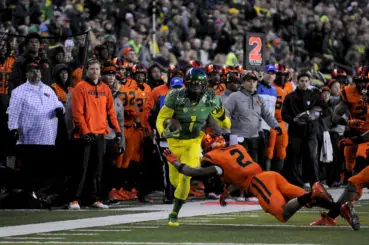
The Beavers came within 1 point of Platypus Trophy in 2013. This year will undoubtedly pose a similar challenge.
Every single conference game will be a challenge this year. To reach his five-win performance bonus, Helfrich needed to bag the Cougars yesterday, he’ll need a Beaver pelt from the Civil War, and he’ll still need to upset one of the six teams in between.
Prior to the start of the season, I dismissed the punditry trumpeting a five-loss season out of hand. I’m now struggling to see how Helfrich will claim his performance bonus this year. That should be all the incentive Mr. Mullens needs to think about the future.
I think Aliotti is still available.
Matt grew up in Oregon, graduated UO in 1998, and tried to impress a young lady (not from Oregon) by going to law a fancy law school on the East Coast. He did pretty well in law school but never saw the young lady again. Matt is now a lawyer in New York where he bores everyone around him with tales of how much better life can be in the Pacific NW usually carrying on about the biking, the coast, the salmon, the complete lack of humidity, Reubens from The Goose Hollow Inn, and Ducks football.
When Matt is not litigating high-stakes, important, commercial disputes for important people, arguing important points, or writing important things, he is likely either reading, on his bike, or (from late August through February) watching football. He lives with his family on North Shore of Long Island because the coast overlooking the Sound almost has a real shoreline but still can’t hold a candle to Oregon’s coast.

